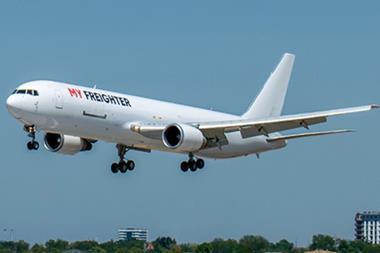The air cargo industry is preparing for what has been described as the biggest product launch in the history of mankind as a Covid-19 vaccine is set to begin distribution this year.
Yesterday, developers Pfizer and BioNTech announced that trials had shown that its vaccine could prevent more than 90% of people from getting Covid-19.
The two firms will now apply for emergency approval to start using the vaccine before the end of November.
The developers hope to be able to supply 50m doses by the end of this year and around 1.3bn by the end of 2021. Each person will need to two doses.
Importantly, the vaccine will need to be stored and transported at minus 80 degrees Celsius, which immediately limits the number of facilities that will be able to handle the vaccine.
Earlier this year, IATA calculated that 8bn doses - to vaccinate the entire global population - would require around 8,000 B747 aircraft — and that’s just under the assumption that a single dose is required.
On that basis, 50 B747 freighter flights worth of capacity will be required for doses produced this year and 1,300 by the end of 2021. However, this statistic is meant to demonstrate the amount of capacity required and in reality doses will be transported from various manufacturing sites to various markets.
Also, overland transport will come into play, taking much of the strain from air cargo.
A white paper from supply chain consultant Europhia Consulting shows that around 3.9bn people live in a country where vaccines are likely to manufactured 'locally', while 4.2bn people live in countries that are likely to need a vaccine to be shipped in from other parts of the world.
The biggest challenge will be connecting manufacturer production sites to distribution markets, Europhia said.
"For large distribution markets such as the US, Europe, Russia, India, China and Brazil, most vaccines will probably be distributed from 'local' production sites using road transport," the consultant explained.
"The capacity requirements of temperature-controlled trucks will be substantial. On the other hand, there will be many other countries across all continents that will require airfreight solutions to get access to vaccines. Each will face their own set of challenges including capacity constraints."
The consultant said that IATA's estimate could be an understated number.
"For example, to illustrate the massive scale of capacity required, the current population of the United Kingdom is 62m people," it said. "Around 100 B777 freighters would be needed to transport a vaccine (double doses per capita) to immunise the UK’s entire population from a faraway manufacturer. That’s just to serve the needs of one country."
It added that airfreight rates should be expected to increase due to capacity constraints as a result of the grounding of bellyhold operations.
The Europhia white paper also looked at other challenges vaccine distribution will face.
Pfizer has stated that its vaccine will need storage and transport temperature of its vaccine to be as low as minus 80 degrees Celsius. Another vaccine being developed by Moderna’s will need a storage and transport temperature of minus 20° C.
"The industry was earlier getting ready to transport these vaccines at temperatures ranging from 2 to 8° C. Temperature needs such as minus 20° C and minus 80° C will further add to complexities since the logistics industry has never seen such kind of a challenge before," Europhia said.
"Many airports do not have such facilities to store large volumes of pharmaceutical products at 2-8° C.
"Using actively cooled containers such as Envirotainers, Skycells and C-Safes could help mitigate some of the risks however the next challenge would be to get these vaccines safely transported to a safe cold chain storage facility in some of these emerging countries.
"Transiting the goods in emerging countries through airports and into trucks will likely form a major challenge.
"Moreover, if frozen storage is required, there are limited airports worldwide that have sufficient deep-freeze warehouse capacity available. For example, there are only four airports in the entire African continent that have this option."
There could also be challenges in delivering the product, with limited reefer truck capacity in some markets. Security will be another concern.
"Whilst a lot of countries and logistics companies have already started to build additional temperature-controlled storage facilities, there is still a long way to go. Several logistics companies such as UPS and DHL have started investing heavily in new temperature-controlled capacity," the consultant added.
"UPS recently added 600 freezers that are capable of handling temperatures as low as minus 80 degrees Celsius near UPS air hubs in Louisville, Kentucky, and in the Netherlands. Each of these freezers has the capacity to hold 48,000 vials of vaccine."
The consultant did point out that a cross dock hub solution would allow manufacturers may drip feed vaccine into countries, rather than having to transport huge batches.
It pointed out that Emirates SkyCargo has just launched a dedicated airside hub at Dubai World Central (DWC) in Dubai as its regional hub for temporary storage of incoming vaccines for onwards distribution to countries.
This would help take some pressure off air cargo supply chains.
Meanwhile, Bolloré Logistics is the latest to announce a vaccine task force to prepare for launch.
The task force will design logistics solutions "ensuring the seamless distribution of the vaccines as soon as they are marketed".
"The controlled-temperature transport of Covid-19 vaccines is a major challenge, as some of them will need to be kept at a temperature of between +2°C and +8°C and others at a very low temperature of around -70°C," the company said.
"As such, Bolloré Logistics is planning ahead and preparing for all possible scenarios, including active and passive packaging solutions. The company, which has obtained CEIV Pharma certification, will rely on its own resources as well as those of its existing subcontractors to transport vaccines by air in respect of the cold chain."















